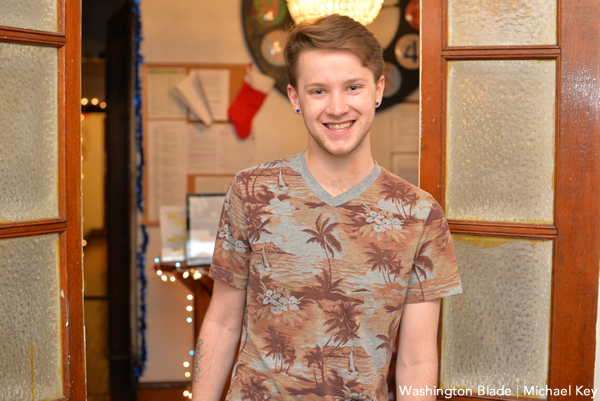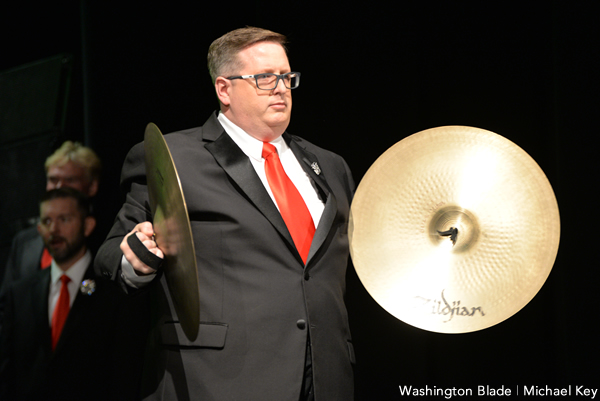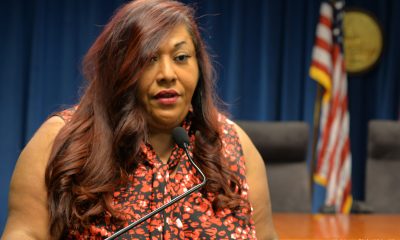a&e features
Hope amid the holidays
Locals talk about escaping homelessness, overcoming family estrangement and surviving a major health scare
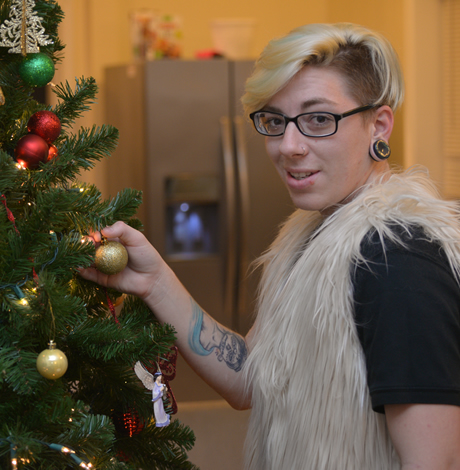
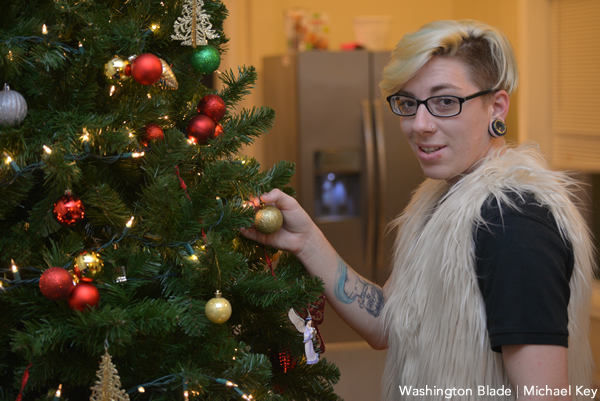
Reevs O’Neal says he was skeptical upon arriving at Casa Ruby but he now credits the center with helping him become self-sufficient. (Washington Blade photo by Michael Key)
As the streets get darker and colder, there is a ray of warmth and light nestled in D.C. in the form of Casa Ruby, a local shelter and transitional housing center for LGBT youth.
Washington Blade staff was invited into Casa Ruby’s transitional housing center and ushered off the dimly lit street into the bright, warm entrance. In mid-December, the home was still waiting to receive its Christmas tree. But even without a tree, the cozy feeling of holiday cheer was present in the jokes and laughter echoing in the hallway between staff and residents and the comforting smiles passed along to one another. Holiday dinners are planned this year with help from the community including those who offer to cook meals and even those who offer to pay for catering.
The center feels like home and that’s because it is one. The staff’s warm and welcoming attitude has created a safe haven for its residents proving that traditional family roles aren’t the only way to create a family.
Casa Ruby, founded in 2012 by Ruby Corado, provides services for LGBT-identifying youth ages 18-24. Their services include a hypothermia center with 16 beds, an emergency shelter with 10 beds and transitional housing with 10 beds. More than 95 percent of the staff identify as transgender or gender non-conforming people of color. They work to provide housing and comfort to those in need with the goal of transitioning them back into jobs and apartments of their own.
Reevs O’Neal, 26, was kicked out of his home in North Carolina. The lack of resources for trans people in his area and his connection to friends in D.C. led him to the District where he connected with Casa Ruby. At first, O’Neal had reservations about the shelter.
“I was very skeptical of it because the continuing theme in my story has been finding somewhere that I thought was safe and it not actually being safe,” O’Neal says. “I sat down with Ruby and we had a really good one on one and it was the first time I had even met her. I was reassured instantly.”
After staying at Casa Ruby for six months, Corado was able to connect O’Neal with low-cost housing. O’Neal was also able to get a job as a house monitor in the emergency shelter. O’Neal says he loves his job because of the family atmosphere.
“We’re a very tight-knit, but open group,” O’Neal says. “I can come into work and it’s like I’m surrounded by people who I love and who I know love me like all the clients. We’re just all very accepting of each other. It’s just like the family aspect of it; it’s amazing.”
Interim Director Lourdes Ashely Hunter has a similar success story. Hunter arrived to D.C. homeless and unemployed with a master’s degree in public administration from Rutgers University. Despite her education, Hunter says her identity prevented her from succeeding.
“As a black, trans, indigenous woman, gender non-conforming person, it’s so challenging to find gainful employment that also affirms my identities and allows me to show up to work whole,” Hunter says. “What’s so magical about this place is that it’s run by the people that it serves. Everyone here has experienced something that our communities are living right now.”
Last Thanksgiving, Hunter joined the dinner as a client of Casa Ruby. This year, Hunter was present at the dinner as the interim director (Corado is taking extended leave in 2016 for health reasons). Hunter says she felt inspired by Corado’s position and understands the power her own leadership can have.
“So for me to now be in this role is so powerful … When I was homeless and didn’t have a job it took for me to see someone in a leadership role like Ruby Corado to say it’s possible,” Hunter says.
Current resident Chris, 22, has high hopes for his own success story. Chris arrived in D.C. seven months ago from Lincoln, Neb., after being kicked out of his home. He worked with the governor of Nebraska as a teenager and is interested in politics, particularly issues surrounding homelessness.
“Since living here, homelessness and youth homelessness is a big issue for me because without Casa Ruby, I wouldn’t be here and I’d probably be who knows where right now,” Chris says.
Chris is currently working on his GED. In his free time he enjoys hanging out with friends and lobbying on Capitol Hill. In the future, he hopes to run for elected office in D.C. The passion he has for his work is supported by Casa Ruby, something other housing programs may not be able to say.
“It takes a lot of compassion and understanding and passion. A lot of times for the shelters that are city run that’s not a requirement of the staff. That’s just the narrative that we’re trying to shift,” Hunter says.
An uphill journey
By Joey DiGuglielmo
Much has been written about the employment challenges facing trans people, income inequality, the exorbitant cost of living in an increasingly gentrified Washington, strained family relations for out folks and more. Benny Rodriguez has lived it all.
Rodriguez, a 24-year-old Virginia native who “hopped around a lot” between New York and Virginia, is 24 and has been out as a trans man for about two years.
He’s down to three part-time jobs now — a few days a week at an art store, part-time at an Indian restaurant and an on-call bartender at Phase 1. At one point he had four jobs and also worked at Busboys and Poets but gave it up because he says it wasn’t financially worthwhile. Combined he makes about $1,600 a month — enough to rent a room in a house with a family with two small children in Columbia Heights.
“There’s been no issue with me being trans and I preface that with the fact that I am two years now on hormones so I pass almost all the time,” Rodriguez says. “That makes it easier … and I can be more stealth than I used to be. When I first started (transitioning), I had to sort of convince people that I was really trans. I had to conceal a lot.”
Rodriguez formerly performed with the D.C. Kings but since that group folded earlier this year, he now does occasional shows with the D.C. Gurly Show “pretty regularly.”
In many ways, Rodriguez says, 2015 was a tough year.
“It’s definitely been up and down,” he says. “Certainly not the worst year I’ve ever had, but it was a year of growing.”
Family life is tough. He’s “definitely grateful my Mom still talks to me.” Other relatives are “kind of estranged.”
“I had to cut ties with them,” he says. “They were toxic and it was to the point where it was more harmful than helpful to be with them so I don’t really say much to many of them, my father especially. I want to say that my situation is unique, but I really don’t think it is. I think it’s pretty common for trans people in general to lose touch with their families. … It’s so hard for many people to wrap their head around.”
Rodriguez will spend Christmas with a friend’s mother whom he says is “kind of like a second mother who helped raise me.” He’s not a big Christmas or holidays person in general but does say he “quite enjoys” this time of year.
He’s excited about the top surgery he’s having in late February. Through decent D.C. health insurance and the services of Whitman-Walker, he won’t have to pay for it. He wishes his mom could be there with him but says he has a good network of friends who will help him recover.
Despite depression and constant reminders of life’s challenges, Rodriguez says he senses he’s been dealt this hand for a reason.
“Things get very hard to get through sometime but I feel very strongly that I have some sense of purpose,” he says. “Whether it’s just to talk to people or change lives or achieve some sort of human greatness, I’m not sure but I feel like I have a job to do and that job is not fulfilled. Knowing that kind of keeps me going.”
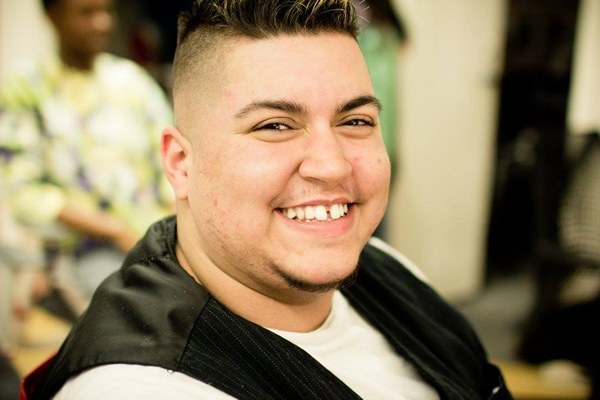
Benson Rodriguez say the holidays are tough when family relations are strained. (Photo courtesy Rodriguez)
A second chance
By Joey DiGuglielmo
Robby Dean collapsed in the cafeteria at his job as a department specialist for Safeway in Lanham, Md., on Aug. 7.
It was a scary episode in which he recalls not being able to see, hear or breathe, yet still being conscious. His blood pressure plummeted and he was taken to Prince George’s Hospital Center where it was discovered that he had a “very large” saddlebag pulmonary embolism — essentially a blood clot of the lungs that was “saddle bagged” on both sides of his pulmonary artery.
It was difficult finding a place to have the clot removed but it was quickly deemed an emergency case. A doctor who’d seen his chart and tests said the life-threatening condition could not be delayed even a few hours.
His boyfriend of three years met him at the hospital. Doctors were able to go in through his neck, remove part of the clot and dissolve the rest through blood thinners.
“I had no idea what a pulmonary embolism was until after the surgery when I looked it up,” says the 48-year-old Gainesville, Ga., native. “The first statement said these are usually found during an autopsy.”
The only warning signs had been a few episodes of dizziness in the weeks prior. Except for some weight issues following a car accident a few years ago, Dean was in good health. Despite only being in the hospital for the weekend, it took him a month to recover sufficiently to return to work full time.
Singing the Sondheim song “Being Alive” in “The S Show” — he sings tenor in the Gay Men’s Chorus — took on added poignancy at their recent Home Cooked Cabaret events.
“It’s very emotional and hard to get through without crying,” Dean says. “It taught me to listen to my body more and not avoid the doctor and take better care of myself.”
He’s spending Christmas at home with his family in Georgia for the first time since he came to the Washington area six years ago. He says his health scare made him look at life differently.
“You have to cherish every moment you have with the ones you love,” he says. “You never know when it might be your last time seeing them. Going through something like this really reminds you how short life can be.”
a&e features
Visit Cambridge, a ‘beautiful secret’ on Maryland’s Eastern Shore
New organization promotes town’s welcoming vibe, LGBTQ inclusion

CAMBRIDGE, Md. — Driving through this scenic, historic town on Maryland’s Eastern Shore, you’ll be charmed by streets lined with unique shops, restaurants, and beautifully restored Victorian homes. You’ll also be struck by the number of LGBTQ Pride flags flying throughout the town.
The flags are a reassuring signal that everyone is welcome here, despite the town’s location in ruby red Dorchester County, which voted for Donald Trump over Kamala Harris by a lopsided margin. But don’t let that deter you from visiting. A new organization, Proudly Cambridge, is holding its debut Pride event this weekend, touting the town’s welcoming, inclusive culture.
“We stumbled on a beautiful secret and we wanted to help get the word out,” said James Lumalcuri of the effort to create Proudly Cambridge.
The organization celebrates diversity, enhances public spaces, and seeks to uplift all that Cambridge has to share, according to its mission statement, under the tagline “You Belong Here.”
The group has so far held informal movie nights and a picnic and garden party; the launch party is June 28 at the Cambridge Yacht Club, which will feature a Pride celebration and tea dance. The event’s 75 tickets sold out quickly and proceeds benefit DoCo Pride.
“Tickets went faster than we imagined and we’re bummed we can’t welcome everyone who wanted to come,” Lumalcuri said, adding that organizers plan to make “Cheers on the Choptank” an annual event with added capacity next year.
One of the group’s first projects was to distribute free Pride flags to anyone who requested one and the result is a visually striking display of a large number of flags flying all over town. Up next: Proudly Cambridge plans to roll out a program offering affirming businesses rainbow crab stickers to show their inclusiveness and LGBTQ support. The group also wants to engage with potential visitors and homebuyers.
“We want to spread the word outside of Cambridge — in D.C. and Baltimore — who don’t know about Cambridge,” Lumalcuri said. “We want them to come and know we are a safe haven. You can exist here and feel comfortable and supported by neighbors in a way that we didn’t anticipate when we moved here.”

Lumalcuri, 53, a federal government employee, and his husband, Lou Cardenas, 62, a Realtor, purchased a Victorian house in Cambridge in 2021 and embarked on an extensive renovation. The couple also owns a home in Adams Morgan in D.C.
“We saw the opportunity here and wanted to share it with others,” Cardenas said. “There’s lots of housing inventory in the $300-400,000 range … we’re not here to gentrify people out of town because a lot of these homes are just empty and need to be fixed up and we’re happy to be a part of that.”
Lumalcuri was talking with friends one Sunday last year at the gazebo (affectionately known as the “gayzebo” by locals) at the Yacht Club and the idea for Proudly Cambridge was born. The founding board members are Lumalcuri, Corey van Vlymen, Brian Orjuela, Lauren Mross, and Caleb Holland. The group is currently working toward forming a 501(c)3.
“We need visibility and support for those who need it,” Mross said. “We started making lists of what we wanted to do and the five of us ran with it. We started meeting weekly and solidified what we wanted to do.”
Mross, 50, a brand strategist and web designer, moved to Cambridge from Atlanta with her wife three years ago. They knew they wanted to be near the water and farther north and began researching their options when they discovered Cambridge.
“I had not heard of Cambridge but the location seemed perfect,” she said. “I pointed on a map and said this is where we’re going to move.”
The couple packed up, bought a camper trailer and parked it in different campsites but kept coming back to Cambridge.
“I didn’t know how right it was until we moved here,” she said. “It’s the most welcoming place … there’s an energy vortex here – how did so many cool, progressive people end up in one place?”
Corey van Vlymen and his husband live in D.C. and were looking for a second home. They considered Lost River, W.Va., but decided they preferred to be on the water.
“We looked at a map on both sides of the bay and came to Cambridge on a Saturday and bought a house that day,” said van Vlymen, 39, a senior scientist at Booz Allen Hamilton. They’ve owned in Cambridge for two years.
They were drawn to Cambridge due to its location on the water, the affordable housing inventory, and its proximity to D.C.; it’s about an hour and 20 minutes away.
Now, through the work of Proudly Cambridge, they hope to highlight the town’s many attributes to residents and visitors alike.
“Something we all agree on is there’s a perception problem for Cambridge and a lack of awareness,” van Vlymen said. “If you tell someone you’re going to Cambridge, chances are they think, ‘England or Massachusetts?’”
He cited the affordability and the opportunity to save older, historic homes as a big draw for buyers.
“It’s all about celebrating all the things that make Cambridge great,” Mross added. “Our monthly social events are joyful and celebratory.” A recent game night drew about 70 people.
She noted that the goal is not to gentrify the town and push longtime residents out, but to uplift all the people who are already there while welcoming new visitors and future residents.
They also noted that Proudly Cambridge does not seek to supplant existing Pride-focused organizations. Dorchester County Pride organizes countywide Pride events and Delmarva Pride was held in nearby Easton two weeks ago.
“We celebrate all diversity but are gay powered and gay led,” Mross noted.
To learn more about Proudly Cambridge, visit the group on Facebook and Instagram.
What to see and do
Cambridge, located 13 miles up the Choptank River from the Chesapeake Bay, has a population of roughly 15,000. It was settled in 1684 and named for the English university town in 1686. It is home to the Harriet Tubman Museum, mural, and monument. Its proximity to the Blackwater National Wildlife Refuge makes it a popular stop for birders, drawn to more than 27,000 acres of marshland dubbed “the Everglades of the north.”
The refuge is walkable, bikeable, and driveable, making it an accessible attraction for all. There are kayaking and biking tours through Blackwater Adventures (blackwateradventuresmd.com).
Back in town, take a stroll along the water and through historic downtown and admire the architecture. Take in the striking Harriet Tubman mural (424 Race St.). Shop in the many local boutiques, and don’t miss the gay-owned Shorelife Home and Gifts (421 Race St.), filled with stylish coastal décor items.
Stop for breakfast or lunch at Black Water Bakery (429 Race St.), which offers a full compliment of coffee drinks along with a build-your-own mimosa bar and a full menu of creative cocktails.
The Cambridge Yacht Club (1 Mill St.) is always bustling but you need to be a member to get in. Snapper’s on the water is temporarily closed for renovations. RaR Brewing (rarbrewing.com) is popular for craft beers served in an 80-year-old former pool hall and bowling alley. The menu offers burgers, wings, and other bar fare.
For dinner or wine, don’t miss the fantastic Vintage 414 (414 Race St.), which offers lunch, dinner, wine tasting events, specialty foods, and a large selection of wines. The homemade cheddar crackers, inventive flatbreads, and creative desserts (citrus olive oil cake, carrot cake trifle) were a hit on a recent visit.
Also nearby is Ava’s (305 High St.), a regional chain offering outstanding Italian dishes, pizzas, and more.
For something off the beaten path, visit Emily’s Produce (22143 Church Creek Rd.) for its nursery, produce, and prepared meals.
“Ten minutes into the sticks there’s a place called Emily’s Produce, where you can pay $5 and walk through a field and pick sunflowers, blueberries, you can feed the goats … and they have great food,” van Vlymen said.
As for accommodations, there’s the Hyatt Regency Chesapeake Bay (100 Heron Blvd. at Route 50), a resort complex with golf course, spa, and marina. Otherwise, check out Airbnb and VRBO for short-term rentals closer to downtown.
Its proximity to D.C. and Baltimore makes Cambridge an ideal weekend getaway. The large LGBTQ population is welcoming and they are happy to talk up their town and show you around.
“There’s a closeness among the neighbors that I wasn’t feeling in D.C.,” Lumalcuri said. “We look after each other.”
a&e features
James Baldwin bio shows how much of his life is revealed in his work
‘A Love Story’ is first major book on acclaimed author’s life in 30 years

‘Baldwin: A Love Story’
By Nicholas Boggs
c.2025, FSG
$35/704 pages
“Baldwin: A Love Story” is a sympathetic biography, the first major one in 30 years, of acclaimed Black gay writer James Baldwin. Drawing on Baldwin’s fiction, essays, and letters, Nicolas Boggs, a white writer who rediscovered and co-edited a new edition of a long-lost Baldwin book, explores Baldwin’s life and work through focusing on his lovers, mentors, and inspirations.
The book begins with a quick look at Baldwin’s childhood in Harlem, and his difficult relationship with his religious, angry stepfather. Baldwin’s experience with Orilla Miller, a white teacher who encouraged the boy’s writing and took him to plays and movies, even against his father’s wishes, helped shape his life and tempered his feelings toward white people. When Baldwin later joined a church and became a child preacher, though, he felt conflicted between academic success and religious demands, even denouncing Miller at one point. In a fascinating late essay, Baldwin also described his teenage sexual relationship with a mobster, who showed him off in public.
Baldwin’s romantic life was complicated, as he preferred men who were not outwardly gay. Indeed, many would marry women and have children while also involved with Baldwin. Still, they would often remain friends and enabled Baldwin’s work. Lucien Happersberger, who met Baldwin while both were living in Paris, sent him to a Swiss village, where he wrote his first novel, “Go Tell It on the Mountain,” as well as an essay, “Stranger in the Village,” about the oddness of being the first Black person many villagers had ever seen. Baldwin met Turkish actor Engin Cezzar in New York at the Actors’ Studio; Baldwin later spent time in Istanbul with Cezzar and his wife, finishing “Another Country” and directing a controversial play about Turkish prisoners that depicted sexuality and gender.
Baldwin collaborated with French artist Yoran Cazac on a children’s book, which later vanished. Boggs writes of his excitement about coming across this book while a student at Yale and how he later interviewed Cazac and his wife while also republishing the book. Baldwin also had many tumultuous sexual relationships with young men whom he tried to mentor and shape, most of which led to drama and despair.
The book carefully examines Baldwin’s development as a writer. “Go Tell It on the Mountain” draws heavily on his early life, giving subtle signs of the main character John’s sexuality, while “Giovanni’s Room” bravely and openly shows a homosexual relationship, highly controversial at the time. “If Beale Street Could Talk” features a woman as its main character and narrator, the first time Baldwin wrote fully through a woman’s perspective. His essays feel deeply personal, even if they do not reveal everything; Lucian is the unnamed visiting friend in one who the police briefly detained along with Baldwin. He found New York too distracting to write, spending his time there with friends and family or on business. He was close friends with modernist painter Beauford Delaney, also gay, who helped Baldwin see that a Black man could thrive as an artist. Delaney would later move to France, staying near Baldwin’s home.
An epilogue has Boggs writing about encountering Baldwin’s work as one of the few white students in a majority-Black school. It helpfully reminds us that Baldwin connects to all who feel different, no matter their race, sexuality, gender, or class. A well-written, easy-flowing biography, with many excerpts from Baldwin’s writing, it shows how much of his life is revealed in his work. Let’s hope it encourages reading the work, either again or for the first time.
a&e features
Looking back at 50 years of Pride in D.C
Washington Blade’s unique archives chronicle highs, lows of our movement
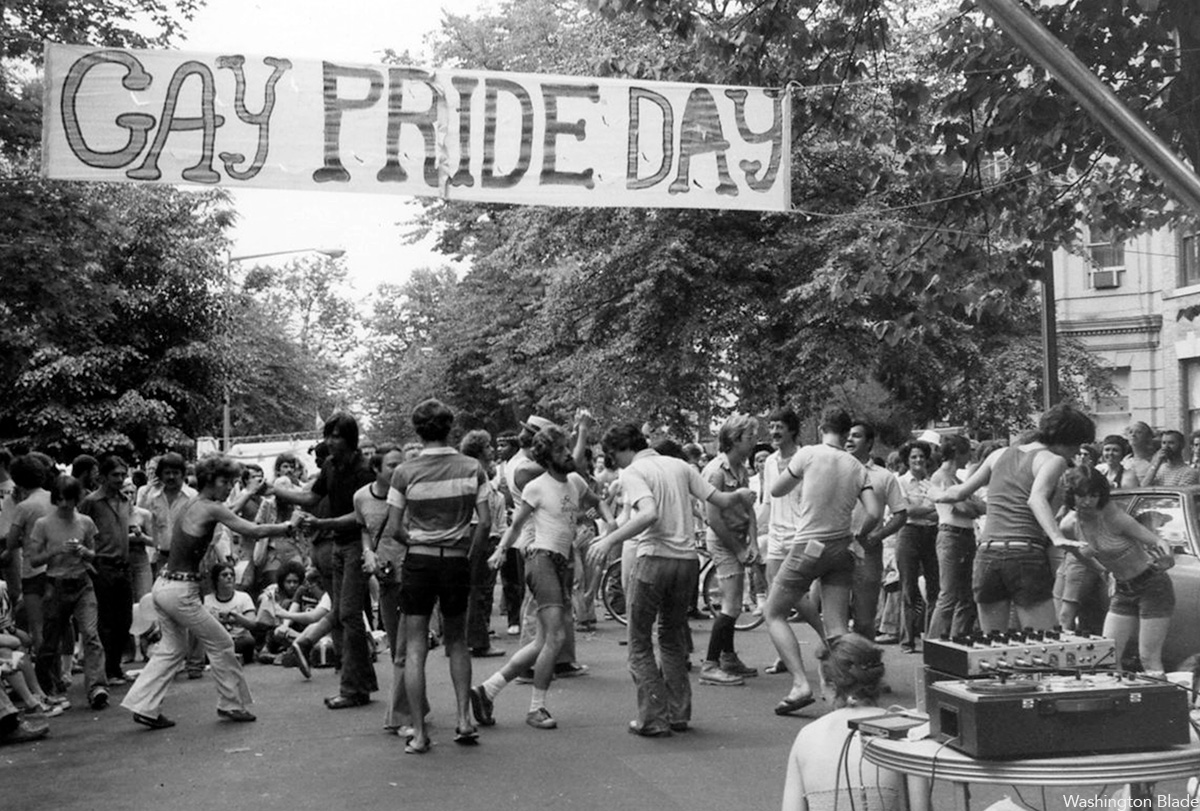
To celebrate the 50th anniversary of LGBTQ Pride in Washington, D.C., the Washington Blade team combed our archives and put together a glossy magazine showcasing five decades of celebrations in the city. Below is a sampling of images from the magazine but be sure to find a print copy starting this week.
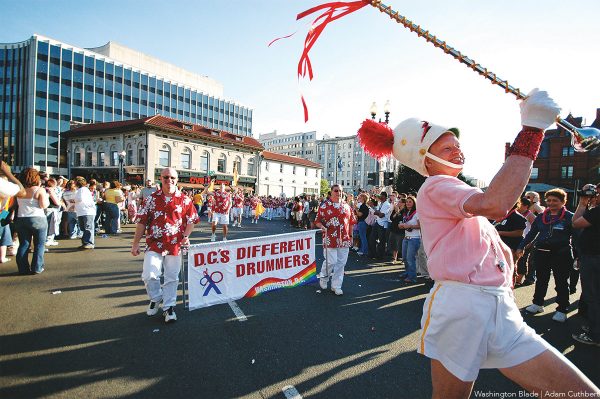
The magazine is being distributed now and is complimentary. You can find copies at LGBTQ bars and restaurants across the city. Or visit the Blade booth at the Pride festival on June 7 and 8 where we will distribute copies.
Thank you to our advertisers and sponsors, whose support has enabled us to distribute the magazine free of charge. And thanks to our dedicated team at the Blade, especially Photo Editor Michael Key, who spent many hours searching the archives for the best images, many of which are unique to the Blade and cannot be found elsewhere. And thanks to our dynamic production team of Meaghan Juba, who designed the magazine, and Phil Rockstroh who managed the process. Stephen Rutgers and Brian Pitts handled sales and marketing and staff writers Lou Chibbaro Jr., Christopher Kane, Michael K. Lavers, Joe Reberkenny along with freelancer and former Blade staffer Joey DiGuglielmo wrote the essays.

The magazine represents more than 50 years of hard work by countless reporters, editors, advertising sales reps, photographers, and other media professionals who have brought you the Washington Blade since 1969.
We hope you enjoy the magazine and keep it as a reminder of all the many ups and downs our local LGBTQ community has experienced over the past 50 years.
I hope you will consider supporting our vital mission by becoming a Blade member today. At a time when reliable, accurate LGBTQ news is more essential than ever, your contribution helps make it possible. With a monthly gift starting at just $7, you’ll ensure that the Blade remains a trusted, free resource for the community — now and for years to come. Click here to help fund LGBTQ journalism.
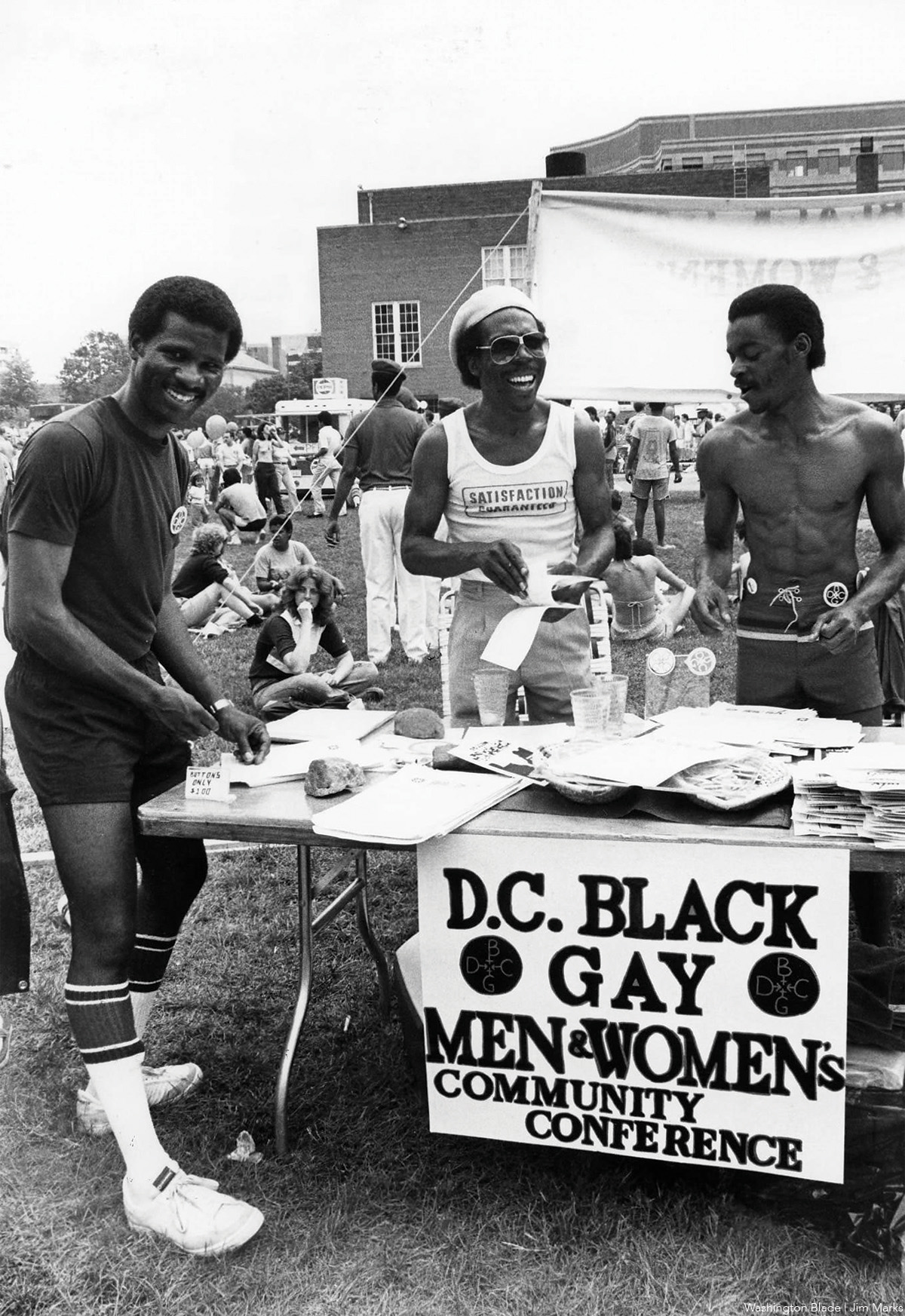
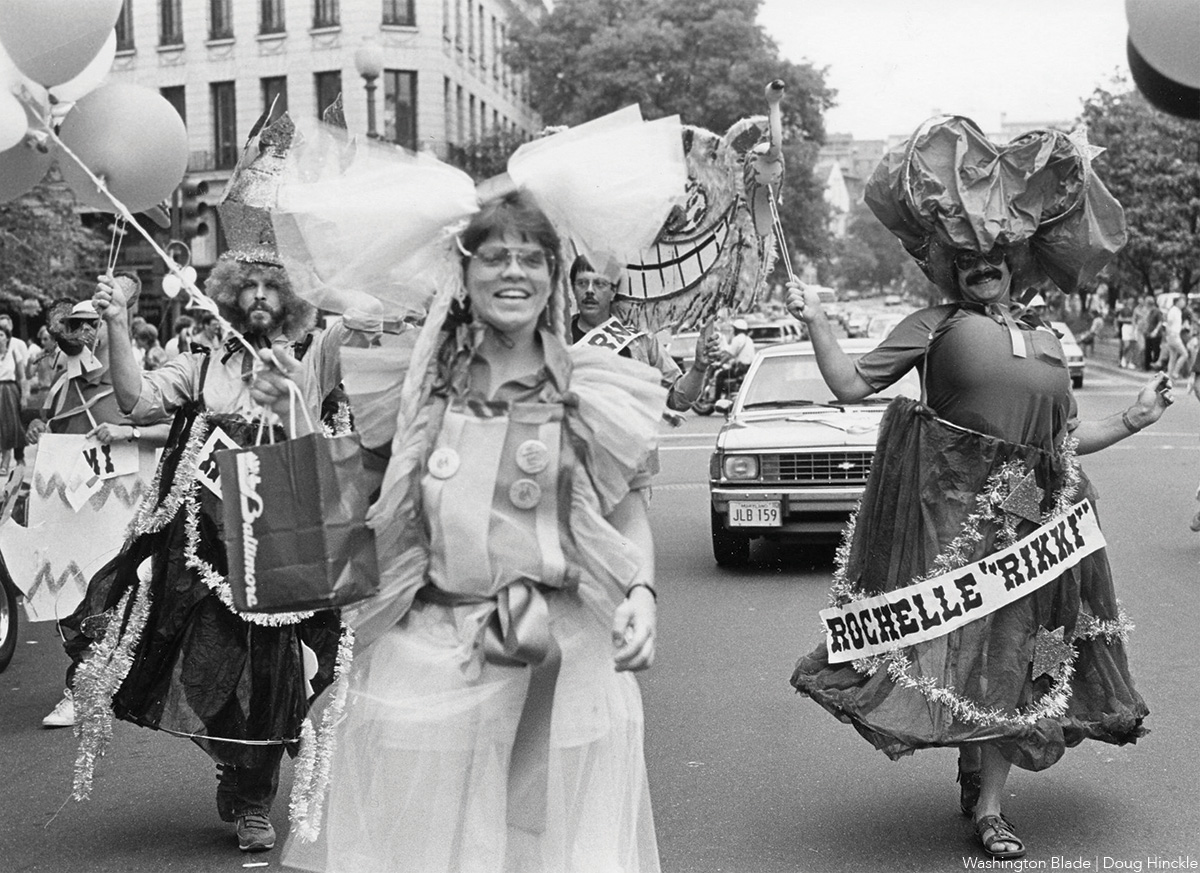

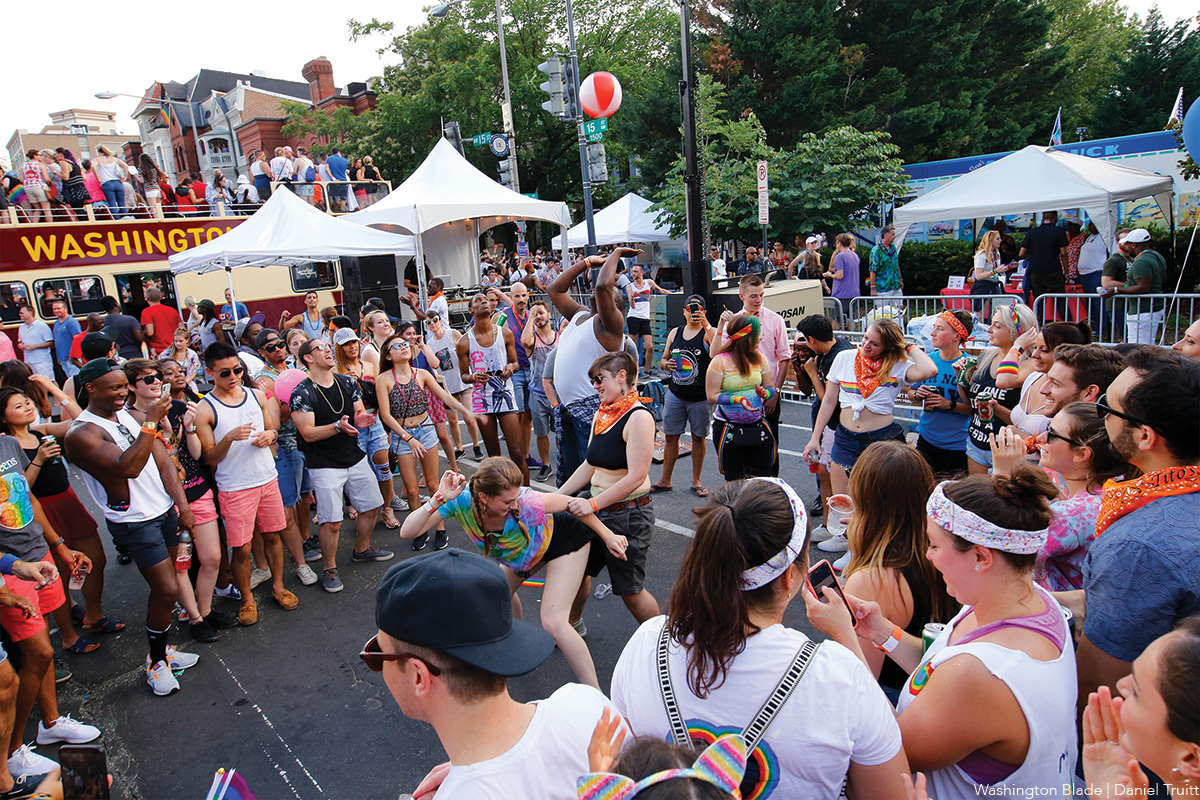
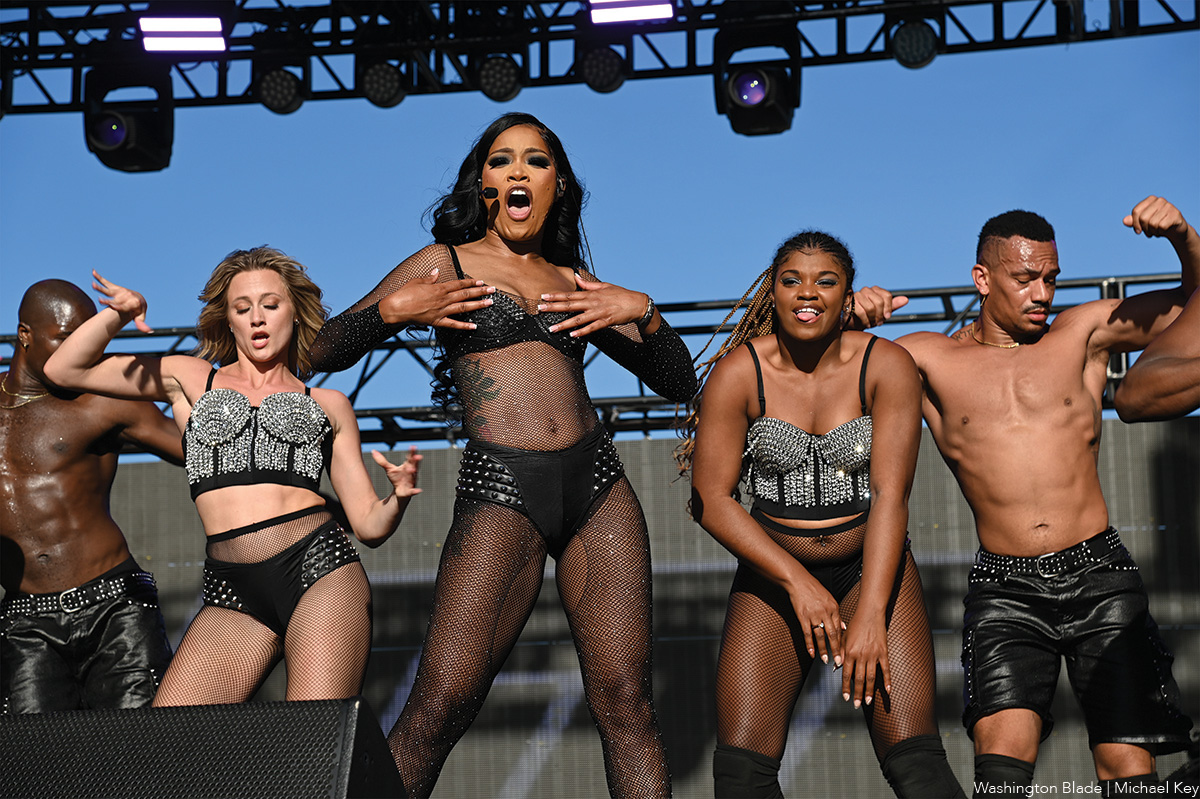
-

 U.S. Supreme Court4 days ago
U.S. Supreme Court4 days agoSupreme Court upholds ACA rule that makes PrEP, other preventative care free
-

 U.S. Supreme Court4 days ago
U.S. Supreme Court4 days agoSupreme Court rules parents must have option to opt children out of LGBTQ-specific lessons
-

 National5 days ago
National5 days agoEvan Wolfson on the 10-year legacy of marriage equality
-

 Congress5 days ago
Congress5 days agoSenate parliamentarian orders removal of gender-affirming care ban from GOP reconciliation bill

